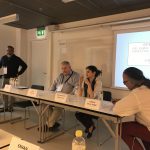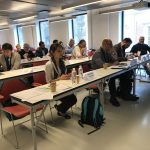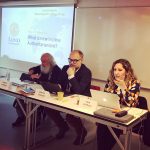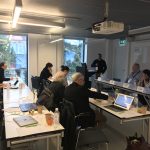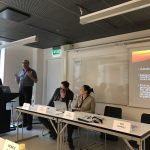Near East University, Economics and Administrative Sciences Faculty members Assoc. Prof. Dr. Nur Köprülü and Asst. Prof. Dr. Assel Tutumlu organized an international workshop on the topic of “What’s new in new authoritarianism” at Lund University in Sweden last week.
According to the press release issued by the Directorate of Press and Public Relations Office of the Near East University, Assoc. Prof. Dr. Nur Köprülü, Head of the Department of Political Science and Asst. Prof. Dr. Assel Tutumlu, lecturer at the Department of International Relations from the Faculty of Economics and Administrative Sciences organized this workshop with the aim of both evaluating academic debates on authoritarianism in changing global context with the election of populist and right-wing leaders not only in the global South, but also in the North, including the USA, Eastern and Western European countries; and also proceeding to a publication on this timely debate. Dr. Tutumlu, Dr. Köprülü and Dr. Paola Rivetti from University of Dublin City opened the two-days workshop with introductory notes by delivering speeches on Theoretical Debates on Authoritarianism, Historical Trajectories of Authoritarianism and the Convergence of Governance in Authoritarian and Democratic Systems respectively.
Workshop organizers, with the generous support of Dr. Rustamjon Urinboyev and the Swedish Foundation for Humanities and Social Sciences, presented their expertise in different panels on the first day on Authoritarian Liberalism: Case of Kazakhstan and The Trajectories of the Arab Spring: Politics of Uprisings, Reforms and the Persistence of Authoritarianism in MENA respectively.
The International Workshop held at the Department of Sociology of Law in Lund University, Sweden hosted seven panels with specific themes and distinguished speakers from different parts of the world. The conference provided a forum for more than 21 participants, including scholars, experts, young researchers and policy makers across the globe representing universities from Ireland, United Kingdom, USA, Canada, Tunisia, Romania, Puerto Rico, Serbia, Scotland, Uzbekistan, and Russia to exchange their knowledge and experiences through stimulating debates.
Dr. Assel Tutmlu and Dr. Nur Köprülü stated that the academic literature on authoritarianism have been precisely linked to the modernization theory and the robustness of authoritarian regimes which were mainly compared and/ or intertwined with the minimalist or maximalist definitions of democracy of Schumpeter and Dahl. Moreover, some of the scholars explain authoritarian persistence or authoritarianism explanations with regard to democracy, democratization, democratic transition or consolidated democracy studies. The current democratization theory has, thus, borrowed its main arguments from the modernization theory which is based on the experience of the developed states, especially their trajectories of economic development. What the workshop aimed to achieve is to go beyond the existing definitions and conceptualization of authoritarianism in selected regions like Eurasia, Latin America and Middle East and to provide a new analytical framework to underline the need for reconceptualization of this very concept precisely after witnessing various forms authoritarian instabilities across the globe, such as the Arab Spring and Chinese Winter.
Both Köprülü and Tutumlu indicated that they are planning to proceed an international publication with the contributors to the workshop soon.
Photo Gallery
